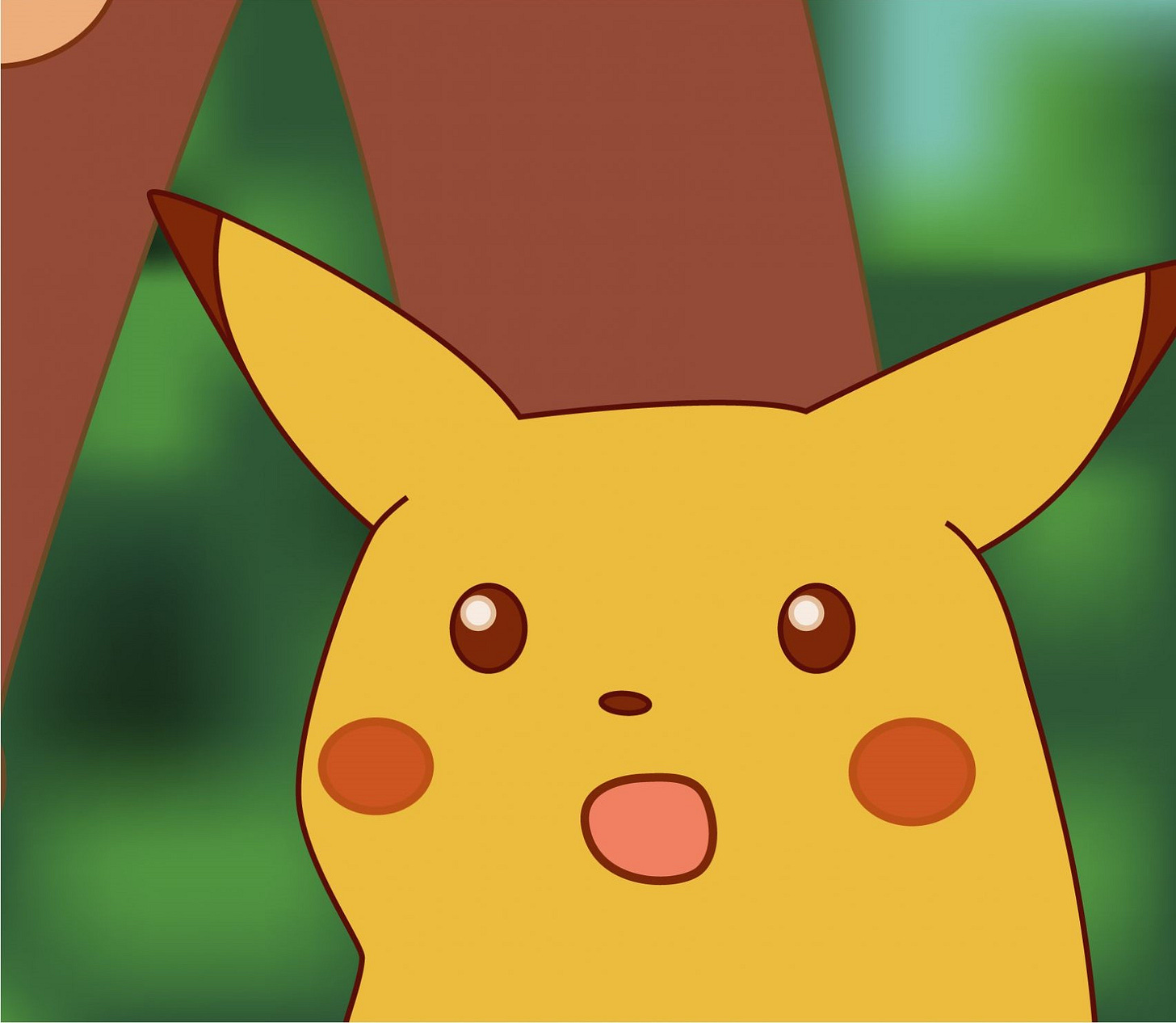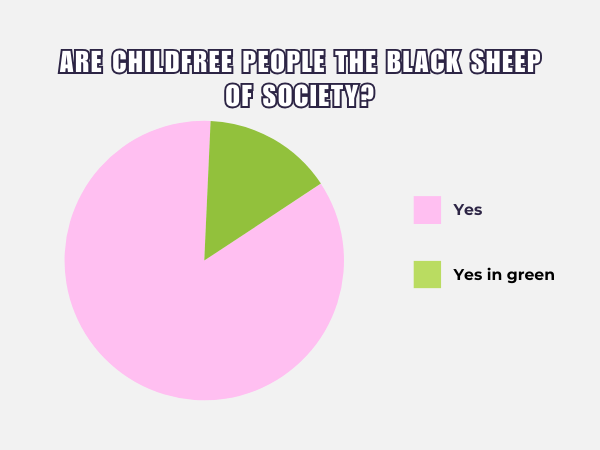No Longer an Outcast: Reclaiming the Black Sheep Narrative
How one childfree woman revels in her role as the family black sheep
The term “black sheep” conjures up all kinds of clichés usually associated with social outcasts: people who don’t fit in, the kind who are commonly shunned.
Or bullied.
Wanna see it in action? Basically any woman who dares to claim she doesn’t want kids will immediately have a online crowd telling her why she’s wrong, stupid, will die alone, should die in a fire, etc etc.
As if women don’t know what they want. We can’t be trusted to know ourselves because our uteruses make us hysterical.
Guess what? We’re tired of being told what we do and don’t know about ourselves. One woman is taking back the moniker and reveling in the title.
On the latest episode of La Vida Más Chévere de Childfree Latinas, guest Shweta Ramkumar shares that she is indeed a black sheep and has no problem with being perceived that way.
Origin of Black Sheep as Outcasts
Where did this term even come from? And how did it become a negative one?
We have good ol’ religion to blame for turning a simple genetic anomaly (the rarity of black sheep) into an object of disdain.
This excerpt from Grammarphobia explains more about the twisted origin of the word:
Among the various theories about how “black sheep” became a negative term, the pejorative use of the word “black” in English may have played a significant role.
As we’ve said, “black” has had negative connotations since Anglo-Saxon days, a usage that the OED describes as “widespread in other European languages, frequently in an antonymic relationship with senses of words meanings ‘white.’ ”
The dictionary says this usage “became particularly strong in the medieval Christian tradition” and would “proliferate in the early modern period … probably connected in part with negative cultural attitudes towards black people prevalent in the context of the Atlantic slave trade.”
- From Grammarphobia
So the culprit is not merely religion but white supremacy as well. What a surprise!
It would appear that even though black sheep were eventually dismissed as inferior because their wool couldn’t be dyed, according to this interesting fact from A Dictionary of English Folklore:
‘We speak figuratively of the one black sheep that is the cause of sorrow in a family; but in its reality it is regarded by the Sussex shepherd as an omen of good luck to his flock’. A number of other nineteenth and twentieth century references, from Somerset, Kent, and Derbyshire, for example, agree with this assessment of the black sheep, but others say the opposite. ‘It was unlucky for the first lamb dropped in lambing season to be black—black twins were more unlucky’ and Charles Igglesden writes the same for Shropshire, adding that the only way to avoid the bad luck is to cut their throats before they can ‘baa’.
Superstitions are another one of those societal norms we should take with less than a grain of salt.
When something is rare, even artificially so like diamonds, it’s considered exclusive and aspirational. But when it’s a runt of the litter or a black sheep in a flock full of white sheep, that’s something to shun? Because it won’t make money?
And there it is folks, the third brother of all social ills: capitalism!
Are Childfree People Black Sheep?
Short answer, yes.
Let’s consider the definition from the OED:
Noun, a disreputable or unsatisfactory member (of a family, etc); a bad character. Frequently in the black sheep of the family (also flock).
-From the Oxford English Dictionary
That definition has evolved to include anyone who is different. Or even eccentric. The crazy cat lady stereotype springs to mind. Basically anyone who doesn’t fit into the mold that’s expected of them.
Or who challenges the status quo, questions traditions, or wants something different than what’s being offered.
Non-conformists.
You. Me.
The very audience for this content!
Whether it's embracing alternative lifestyles, or challenging long-held beliefs, or even pursuing unconventional career paths, black sheep are the ones who dare to be different.
It’s easy to apply the black sheep label in this vein to childfree people. We’re going against the grain. We stand out for our non-conformity. And even if you’re not “out and proud” of your status, anything that makes us different attracts attention.
So yes, we are black sheep. But guess what? We’re not a single sheep in a flock. There’s more of us than ever. With 8 billion people on the planet it’s no wonder not all of them want more of that.
And that’s the rub. Because having the kids and living The LifeScript™ is so common, those of us going “off-script” are at risk of ostracization.
The possibility of being shut out socially, from one’s family or support, is scary. It’s meant to be, because humans are not solitary animals. We need connections, even if in the current state of being in the post-pandemic 21st century, those connections are only virtual.
Taking Back the Term Black Sheep
Shweta mentioned on the show that she’s completely at ease being the black sheep, a role she was born into:
The black sheep is the one that sees through all the bullshit that is there in the family dynamic. And really is vocal about it and really takes that conscious effort to break those cycles of dysfunction and trauma and toxicity. So if anything, I take a lot of pride in being chosen for this role. And I fulfill it to the best of my ability.
Oh yeah, black sheep also have the strength to break generational curses.
Shweta shared her story of choosing to remain childfree because she refuses to pass on her struggles with mental health issues to future generations. By breaking free from the expectation to be a mother AND make her mental health struggles public, Shweta embraced her identity as the black sheep of her family, finding liberation in her decision.
Shweta's story is just one example of how the concept of the black sheep is evolving in the modern era. Instead of being seen as a pariah or outcast, let’s celebrate the black sheep for our bravery, resilience, and willingness to challenge the status quo.
There is power in being different and being unafraid of alienation from your support system. It’s hard to be the one to speak up against harmful traditions, to risk a negative reputation. You remember what they did to witches right? That same fear keeps us calladitas and afraid to use our voices, to stand up against what is not right for us.
Even still, being the black sheep can be a lonely and isolating experience. It can feel like you're constantly swimming against the current, facing judgment, criticism, and sometimes abject rejection from those closest to you. So how do you continue having the courage to live life on your own terms, despite the pressure to conform?
Finding Your Flock of Black Sheep
All the ways we’re different are what make us unique. But how do you find others who are also unique like you? It’s kind of a conundrum, right? We’re all different, but we want people to be different like us.
For example, until recently I was the only person with curly hair in my family (the rest of them are men who are either bald or never let their curls grow out). I hated my hair till I was 25 when someone finally taught me how to take care of it. Imagine going through life with messy hair because no one could show you proper care?
Remember, the internet didn’t exist in its current form in the 90s. I couldn’t simply google “curly hair tips” because Google didn’t even exist.
But now that I know what I’m doing with this beautiful mop of hair, and I’ve found other people like me (thank you Al Gore and your Internet), I no longer feel like an outcast.
Because that’s what black sheep need: community. A flock full of other black sheep.
Finding your people gives you confidence that you’re not alone. And being alone causes true harm. Remember in the episode on shame how guest Rena Martine described it?
[W]hat shame is, it's this idea that there's something broken with us. There's something abnormal about us, that there was nothing wrong with me.…interestingly, it's now universally considered to be a psychologically damaging emotion.
So here are a couple of Shweta’s tips for building that community and avoiding psychological damage:
Get clear on your stance.
Create boundaries so you aren’t brainwashed
Find a mentor or a coach
Search online for childfree communities—like this one!
In the past, it was easy to dismiss online friendships as having less value than IRL ones. But in this post-pandemic Zoom-based world we live in, real friendships are also made online. As I said in that same episode:
I have a ton of friends I have never met in real life, but I know that I can connect with them over a Zoom call, if nothing else. And I have their support, and I have their backing, and vice versa, you know, when they need help.
That is what friendship is. It's having each other's backs.
Need help finding your people? You’re in the right place. This Substack community is a great first step in belonging to a group that won’t shun you because you don’t want kids.
If you need more support, reach out so I can send you links specifically for you.
How to Listen to Unlearning Toxic Cultural Brainwashing
Get the full story by listening to Unlearning Toxic Cultural Brainwashing with Shweta Ramkumar on your favorite podcasting app or on Apple:
🎧Listen on Spotify:
💻Or watch on YouTube:








